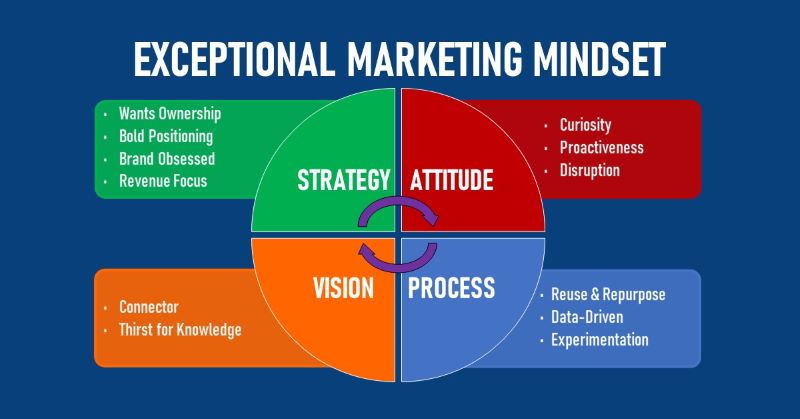The Exceptional Marketing Mindset
A former client, Cassidy Shield, who currently runs marketing at Narrative Science, recently wrote about his company’s effort to define Good vs. Bad Marketing and the twelve traits that distinguish good and bad marketers. This a thought-provoking list that is a stark reminder of what marketers need to do to drive growth. His post inspired us to identify those traits that would be most beneficial for our organization.
Our agency runs on the mantra of the Exceptional Marketing Mindset.
As marketing leaders, we need to be clear on not just the skills and experience we are looking for when recruiting and developing our teams – but also how they think, their mindset if you will. Skills are obviously essential, but marketing changes so quickly that skills can quickly become obsolete. Having the right mindset allows us as marketers to adapt, grow and evolve. As an agency, it is critical that our team finds marketers with traits so that we can deliver outstanding work for our clients.
What Is The Exceptional Marketing Mindset?
Our Exceptional Marketing Mindset framework starts by categorizing 12 desirable traits into 4 key areas; Strategy, Attitude, Process and Vision.
Strategy
A good marketing strategy requires good ingredients. Good marketers with the right attitude, an impeccable process and a strong vision will implement sound marketing strategies. Bad marketers rely on short-term tactics with a narrow vision resulting in an incomplete strategy.
- Wants Ownership: Good marketers demand and take complete ownership of the go-to-market process from end-to-end. Bad marketers make excuses or blame the products.
- Bold Positioning: Good marketers provide strong and clear product positioning in plain language. Bad marketers ignore positioning or hide behind marketing jargon.
- Brand Obsessed: Good marketers are passionate about ensuring that their brand stays consistent internally and externally. Bad marketers allow off-brand activities ‘just this once.’
- Revenue Focus: Good marketers put revenue-generating metrics at the forefront. They know that activity does not equal progress. Bad marketers lose sight of this, focusing on vanity metrics.
Attitude
Attitude has everything to do with culture. It gets at how people approach their work. Is your team curious or indifferent? Are they proactive or reactive? Would they willing to try new things to disrupt the status quo?
- Curiosity: Good marketers are insatiably curious while bad marketers stay on a narrow path. Good marketers always question their marketing analytics and results. They’re wired to understand how things work and discover what’s driving growth, and what is not. Bad marketers just say ho-hum.
- Proactiveness: Good marketers take the initiative while bad marketers wait until someone asks them to do something. Good marketers are organized, detail-oriented and never have to be asked twice.
- Disruption: Good marketers question the status quo while bad marketers just do things the way they have always been done.
Process
A good process drives results. Good marketers plan and implement coordinated campaigns that are integrated, supported by data and always evolving. Good marketers embrace questions about why they did x vs. y, while bad marketers avoid or ignore these questions.
- Reuse & Repurpose: Good marketers run integrated content campaigns that leverage multiple elements. They find creative ways to reuse and redistribute content, turning a single white paper into a webinar and multiple podcasts, blog posts and social posts. Bad marketers run one-off campaigns that aren’t well thought out.
- Data-Driven: Good marketers merge multiple data points with their experience and intuition. Bad marketers rely on gut feel alone.
- Experimentation: Good marketers will experiment while delivering high-quality work. Bad marketers repeat the same campaigns over and over. Asking about A/B testing should not result in a blank stare.
Vision
When you have a clear vision, you will encounter fewer surprises and more opportunities. Good marketers have both an internal and external outlook; they want to talk to everyone and know everything. This broad vision helps them constantly improve their skills. Bad marketers are like ostriches with their heads in the sand and have a limited desire for new knowledge or connections.
- Connectors: Good marketers are relationship builders. They get out of the office to connect with customers, prospects and peers. This is how they learn what matters to their market and anticipate trends. Bad marketers become internally focused, subject to groupthink and buyer blindness.
- Thirst for Knowledge: Good marketers are life-long learners. They make it their job to know everything about their industry and their products. Bad marketers fall back on the same playbook over and over. You will know someone is a good marketer if they are voracious readers and listeners – who can’t wait to share what they have learned with you.
Conclusion
Finding marketers who have all 12 of these traits is challenging. It is easier to train someone on a skill rather than develop a trait. You are going to have to make trade-offs – but it is essential to know going in what those trade-offs are so that you can manage your team effectively. In the future, I will share some tips on how to hire for and implement this exceptional marketer mindset.
Please share your thoughts about my exceptional marketing mindset in the comments below or follow the discussion on Twitter, Facebook and LinkedIn as well as Cassidy’s LinkedIn Post which has many interesting comments.






